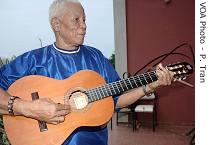2007年VOA标准英语-Octogenarian Cape Verdean Guitarist Reflects on(在线收听)
Praia, Cape Verde
20 May 2007
The West African island nation of Cape Verde has suffered for centuries from periods of severe famine and drought. Most of its residents have immigrated overseas. Musicians still living on the mostly barren archipelago say hard times gave birth to the island's melancholic songs known as morna, with its lyrics of loss and sacrifice. Phuong Tran talks to 78-year-old island guitarist Lela Violao, who traces the changes in this tiny island's history through its music.

Lela Violao practices in Praia Cape Verde
Guitarist Lela Violao was born on the island of Sao Vicente in 1928. Growing up, he says, he remembers hiding his guitar playing from his disapproving father.
Violao says that as a 14-year-old, he earned about five cents playing on the street every night while his father was at work. He says he gave half of his earnings to his step-mother so she would help keep his secret.
A self-taught musician, Violao says there was never a music school when he grew up. Only recently did the former Portuguese-colony open its first music school.
Violao says Cape Verdean musicians have mostly learned on their own, finding the music within them naturally and without any formal instruction.
Violao grew up to practice civil engineering, working on construction projects as more of the country's 10 still-volcanic islands became inhabited.
When he could not find work, he played his guitar, even after losing part of his middle finger in an accident in 1956.
He mostly performed what islanders call morna music, singing about nostalgia, love, loss and sacrifice.
"Cape Verdeans know that our talent comes from the sacrifices others made before us. We are able to sing because others have died of hunger for us," said Violao. "Our strength comes from this history of perseverance and hope."
"Morna is the saddest of our island's songs," he added. "If you are already feeling sad when you listen to it, you will feel the pain even deeper. The songs talk about eternity. That is a long time to feel sadness."
Waves of drought in Cape Verde prompted massive emigration throughout the 20th century, to the point more Cape Verdeans now live outside the country than in it. Even as recent as five years ago, the Cape Verdean government asked for international aid after a bad harvest.
But Violao says things are changing for the island.
"I grew up in a different time when people were dying of hunger," he said. "Now, more Cape Verdeans and donors are giving the island money. I am happy with how the islands are doing."
On average, Cape Verdeans earn more than most of their West African neighbors, about $2,000 a year, and their country is no longer considered one of the world's poorest countries. It is set to become, officially, a middle-income country at the end of this year.
Violao says the music is also changing. Whereas, he says, it changed little before independence from Portugal some 30 years ago, young musicians now are creating more modern genres like this one.
But even with these changes, the island guitarist is not ready to stop singing the hundreds of morna songs he has memorized.
This father of 30 children, married to his 11th wife, says there will always be plenty of reasons to sing morna.